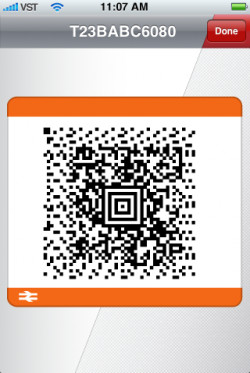The rail industry is set to miss a target to give all passengers the option of travelling without a paper ticket by the end of the year, despite being handed £80m of public money.
The Rail Delivery Group (RDG), which brings together Network Rail and train operating companies (TOCs) to improve the railway, was unable to state when the target would be met.
It follows the failure of the Government’s South East Flexible Ticketing programme, which also had an £80m budget, and again shows the difficulty of delivering improvements for passengers across a fragmented rail industry.

Bar code tickets can be displayed on a phone screen
In October last year, the Department for Transport (DfT) announced an £80m funding package to deliver ‘smart ticketing’. It stated that the funding would ensure that ‘every passenger will have the choice of travelling without a paper ticket by the end of 2018’.
It suggested that this would be a step towards genuinely ‘smart’ ticketing – ‘to give passengers more tailored options to pay for their travel, saving them money and offering better value deals’.
Asked by Transport Network whether the 2018 target would be met, an RDG spokesperson said: ‘A smart ticketing option (barcode or smart card) is on track to be available to almost all passengers on almost all routes by the end of 2018 in line with our long-term plan for change where we committed to delivering smart ticketing for seven out of 10 journeys by the end of 2018.’
Asked when smart ticketing would be available to all passengers, the RDG said: ‘The industry is working hard to ensure that remaining routes are upgraded as soon as possible.’
Behind the scenes (and the barcodes)
The RDG has publicly stated that smart tickets broadly fall into two categories: barcode tickets and smartcard tickets and that there is both an £80m government investment programme for ITSO smartcards, ‘which will mean most journeys can be made by ITSO smartcard’, and a £27m TOC programme for national acceptance of barcode tickets. Both types of ticket could potentially be stored on mobile phones.
At the time of its original announcement, the DfT said that discussions with TOCs about the introduction of ‘mobile phone smart cards’ were at an advanced stage, with deals soon to be reached with three operators.
It said: ‘This will mean that both mobile phone smart cards and mobile barcode tickets will soon be accepted by every operator in England and Wales and be interoperable across different franchises.’
Transport secretary Chris Grayling said: ‘This significant investment will ensure that passengers across the network can use mobile phones, bar codes and smart cards across almost all of the network by the end of next year [2018].’
Signs of trouble
Mr Grayling’s suggestion that it would not be possible for passengers to use all three ‘smart’ ticketing methods to travel across the network by the end of 2018 appears to reflect an understanding even then that the plastic smartcards that are issued by individual TOCs mainly for use across their own franchises would not be widely interoperable.
While this remains the case, TOCs have struggled even to get their smartcards to work across their own networks, particularly where they overlap with other franchises. GTR,the largest franchise in the country, has confirmed that its ‘The Key’ smart card cannot currently be used across its network, specifically where it overlaps with other franchises.
A spokesperson said: ‘Along with all operators, we'll be adding further routes as soon as possible, but it isn't possible to say when all networks will be completely covered. Much depends on the development of the necessary technology.’
Similarly, South Western Railway’s ‘Touch’ smartcard cannot currently be used across its whole network, including stations such as Epsom in Surrey, which is managed by Southern, part of the GTR franchise.
GTR told Transport Network that its difficulty in extending the Key across its own network stems from issues of ‘both equipment and software’.
Transport Network understands that different TOCs’ ITSO ‘front office’ systems use a different hierarchy when looking for a smartcard has caused difficulties, despite the fact ITSO's ‘smart ticketing’ system should deliver interoperability.
Although the RDG has engaged smart ticketing technology firm Rambus to support a wider roll-out of smart ticketing across rail operators in England, the RDG said that it was unable to provide any detail as to which TOCs would have a ticketless process that would work across its own networks or with one or more other TOC systems by the end of the year.
The RDG added that it is leading the industry-funded element of rolling out mobile barcode ticketing but was unable to state when this would be achieved across the network.
Its spokesperson said: We are working to have barcodes operating on almost all routes by the end of 2018 with the remainder upgraded as soon as possible.’
Transport Network has approached the DfT for comment.
Register now for full access
Register just once to get unrestricted, real-time coverage of the issues and challenges facing UK transport and highways engineers.
Full website content includes the latest news, exclusive commentary from leading industry figures and detailed topical analysis of the highways, transportation, environment and place-shaping sectors.
Use the link below to register your details for full, free access.
Already a registered? Login